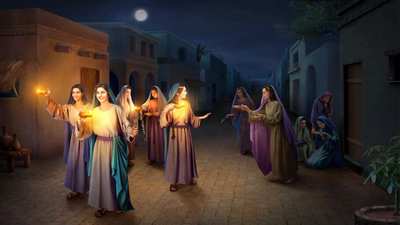                   |
(1)
This is a parable, or an analogy of the Kingdom of the Heavens
specifically as it relates to the return of the Great King to begin His
Kingdom (Matt. 25:1).
(2) The likeness is presented in the context of a Jewish wedding of Jesus’ day. On the day of the wedding, the groom would go to the bride’s house to claim her from her parents. The marriage ceremony would take place at the bride’s parents’ home. That evening, the groom would take his new bride in a procession through the streets, headed toward his home, where the wedding banquet would take place. The virgins in this parable were awaiting the night-time arrival of the groom and his bride. They would join the procession and participate in the banquet at the groom’s house. (3) The ten virgins, intending to enjoy participation in the wedding banquet were portrayed as five wise virgins and five foolish virgins. The wise prepared ahead of time and brought sufficient olive oil in their flasks to keep their lamps lit. The foolish did not do so (Matt. 25:2-5). (4) At midnight there was a shout – “Look! – the Bridegroom!” The foolish asked for oil from the wise, who declined for good reason – they did not wish to be without light traveling to the banquet (Matt. 25:6-9). (5) Finally the foolish went to buy oil at the last minute (Matt. 25:10). (6) Meanwhile the bridegroom came, and the five wise virgins joined the procession and were admitted into the bridegroom’s home to join in the wedding banquet. The text states clearly, “The door was shut" (Matt. 25:10). (7) Later, the five foolish virgins arrived, requesting, “Lord, lord, open for us (Matt. 25:11)!” But he (presumably the Bridegroom) declined, saying, “Truly I say to you, I do not know you" (Matt. 25:12). (8) Jesus’ terse application was, “Be on the alert then, for you do not know the day or the hour" (Matt. 25:13). (9) Several applications are in order: a) The time to prepare for the Lord’s coming is now.
b) When he does arrive, it will be too late to prepare. Preparation must be done ahead of time.
c)
The possession of oil seems to represent the possession of the Holy
Spirit. This, in turn, indicates spiritual birth through faith in the
Messiah. It seems the five wise virgins possessed the Holy Spirit and
were spiritually regenerate. The five foolish did not possess the
Spirit and were not regenerate.
d)
The virgins represent not the Bride, but guests at the wedding. Only
the Church constitutes the Bride of Christ. Therefore the virgins
represent Israelis invited to the wedding banquet.
e) The preparedness represents the possession of the Spirit and diligent readiness for Christ’s return.
f)
So this passage reflects the judgment of Israel at the end of the
Tribulation. When Christ returns some Israelis will be ready for His
return and will join in the Wedding Banquet, symbolic of the Kingdom of
the Heavens. The unprepared virgins represent unbelieving Israelis,
those who will be barred from the Kingdom of the Heavens. The Lord, the
Bridegroom, will deny them admittance into His Kingdom, for He never
knew them in the first place.
|
|||||

